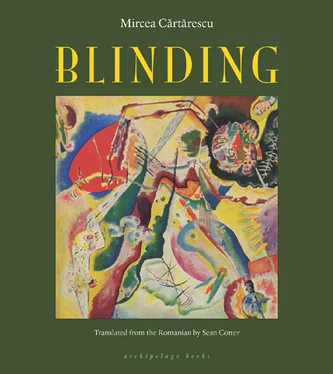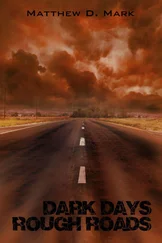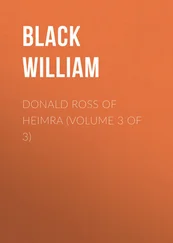UNUSUALLY for me, I started to linger at the table after eating, talking with Mamma, who was happy to remember one thing or another from the past. The table, with its torn plastic cloth, was laden with chipped and dirty plates, and with spoons and forks that, no one knows why, were larger than any others I had ever seen. Their metal, maybe plated, was twisted in strange ways: hunched spoons, forks with bent tongs, teaspoons as big as other people’s serving spoons, and a gigantic ladle. Mamma, silhouetted against the summer sky (where the tips of poplar trees rose, full of seed puffs and the crenellations of the Dâmboviţa mill), with her face thin like mine and her skin soft, spoke more for herself than for me, her attention inward, her voice mixing with the sound of doves and the scent of summer. I pushed a wasp into the honey and watched it writhe, heavy, a bubble of air between its jaws, while Mamma told old stories about her childhood in the country, with my grandparents “Mămica” and “Tătica,” who appeared in her dreams almost every night, about the family house, old and rotted, in Tântava, with all the rituals of Romanized Bulgarians, wrapped in the mystical incense of Orthodoxy and an ancient, un-Christian fear, talking about Christ and the Virgin and archangels without knowing the first thing about the Bible, singing their carols like petrified stories, with no clue who Herod was or the magi. As children, Mamma and the other girls her age had sent balls of eggshell-covered clay down the waters of the Argeş, the same river where today they cast kolaches with burning candles toward the souls of the dead. During droughts she had helped whip and then chop down the troiţe and icons, the vengeance of the village on a persecuting God. She had seen the Mother of God and Infant Son spit on and lashed by people who had knelt and kissed her since before they could remember, who now moaned like people in a trance: “Give us rain! Give us rain!” She had seen the gypsy girls led to the edge of the village and doused with trays and vials of water while they danced for rain, naked and black paparuda , hips already womanly, the udders of their breasts starting to fill, covering their blameless embarrassment, not yet hairy, with a few elderberry leaves. After the dance, they were given to the gypsy men, the bear keeper and the violin player, who took them into the forest and raped them in turns, so it would rain. The country people would swear that next the girls were given to the bear, who crushed their thin bones under arbors of raspberries. As a kid, nothing scared Mamma so much as the priest, because whenever one of the village kids cried, rocked on their mothers’ legs or in wooden cradles, they’d be told “the priest will cut off your tongue,” and here there must have been a memory housed not in the mind, but in the infants’ bodies, naked and snatched up brutally by the priest, his paw held over their noses and mouths as he dunked them three times in the icy fount. Bearded and vicious, in mystical vestments, the village priest ravaged the dreams of children sleeping with their heads on straw pillows. Mamma also remembered apocalyptic winters, with snow drifts up to the windows, and the blind furies of her father, who grabbed her one night by the hair and threw her — she would have been five or six — into the piles of snow, in the dark, wearing just her shirt. The terrified little girl had to sleep in the barn, pressed against a cow’s stomach, covered in straw and dung.
I was the same age when I went to Tântava for the first time. The roads were covered in snow. In the center of the village, wafts of ţuica brandy came from the bar. Peasants in shaggy wool coats dotted the snow here and there. If you got close to one of them, you could smell smoke and garlic. We went on our way and, after a long walk, came to my Tataie’s house. We opened the whitewashed gate and entered the yard, stopping between two quince trees. The demon-black dog clanged his chain dementedly, running back and forth, his body so thin you could see his ribs. For all his work, he’d get a dinner of corn meal mămăligă . Into the doorway came Tataie, showing no pleasure, old and fierce with a prickly white beard, his head white and almost completely shaved, with a stripe of darker hair in the middle. The house glowed white like an eggshell in the flames of smoldering dusk. I climbed onto the porch and entered through a thin, bright-red door with a four-paned window. I passed through the entryway, with its dirt floor and whitewashed stove and vents, which opened to the other room, and I entered a place that smelled of goat fur, the room where they sat during the day. The only light was the violet flame (it would change to yellow in an hour) that came in through the window, where the pear tree branches knocked, and reflected in the crooked mirror, high, near the beams. On the walls were cheap paper icons, strident, framed in black: St. George killing a gall-green dragon, the archangel Michael in medieval armor, a flag wrapped around his lance, God himself, in wide blue and yellow robes, holding open a book where something was written in red letters. Many times had I climbed onto the scratchy, quilt-covered beds to look up-close at all these creatures of a ghostly and multifarious world, at the angels’ wings, at the odd, melancholic Omega between the eyebrows of the Mother of God, at the venerable, blackish face, long locks, and white beard of an angry God … I went to the other wall, where, under the same washrags that my mother and her sister had sewn as girls, other images glowed under the pane, this time in strange pink frames of crushed glass. They were tan photos, yellow, sepia, ashen, almost totally faded, where country men and women stood rigid under hats and headscarves, with perhaps two weddings — my mother’s and Aunt Sica’s, pictures I knew from copies in the red bag — and a soldier with a long, old rifle, bayoneted, that was taller than he was. It was Tataie, Dumitru Badislav, the same man who was at that moment pouring hot ţuica into clay cups as small as a thimble. I flopped onto the bed, while the big people sat on three-legged stools by a round table and had a treat. The almost-dark evening, the smell of goat and peppered ţuica, the monotonous small talk, and Tataie’s quiet, wheezing voice all sounded like they came from another age and another world, everything strange and solemn, and it became more otherworldly when the gas lamp on the wall, with its glass and round reflector, was lit. The creatures of transparent wax, flickers and darkness, grave like the Last Supper, and the silence that could happen only in the country — they calmed me, stilled me, with my wide eyes alongside the square table, where the ancient radio and Tataie’s old glasses sat in a dusty still life. My mother’s sister, who puttered around the oven, brought in mămăligă, put it in the middle of a round table and then brought a platter with roast chicken, then another one, smaller, enameled and painted with flowers, with a white garlic sauce. It was a peace from another century, a small world, that belonged to one family, a world protected by winged and holy faces. A smell of clay and holiness filled the room that was now the center of the center of the world. We slept head-to-head in hard beds that were propped on stakes, we rolled into old sheepskin coats and slept heavily, and through the thin walls of our dreams we heard the snow falling. Curled up like a fetus in a belly of old wool and crackling straw, eaten by dozens and hundreds of fleas, I rested my head beside Tatie’s and dreamed his dreams. When a little owl spooked me and I opened my eyes in the dark, I clearly saw — blue, separate, fluttering — a halo of pure light around his spiky head, an intense nimbus like the flame of the stove burners where it emerged from his skull, rarified and yellow, then, a palm’s width to one side, it became perfectly circular, with a line of liquid diamond outlining it precisely, like a great, miraculous platter of rays, on which the old head would be placed. I felt in my sleep how, in this geyser of light, my own cranium became transparent, how the wrinkled hemispheres of my brain, wrapped in their skin, looked like the meat of walnuts yet unformed. The neurons under the pia mater, like spores bedded under asphalt, swelled here and there, growing hundreds of church spires under the sky of my skull, each one with a bell tolling for a funeral, until the pearly skin broke in hundreds of places and the neuron bells opened like wonders, like sea urchins on their peduncles, rocking and undulating in the solar wind of my Tataie’s halo. I then descended into a delirious Scythia.
Читать дальше












